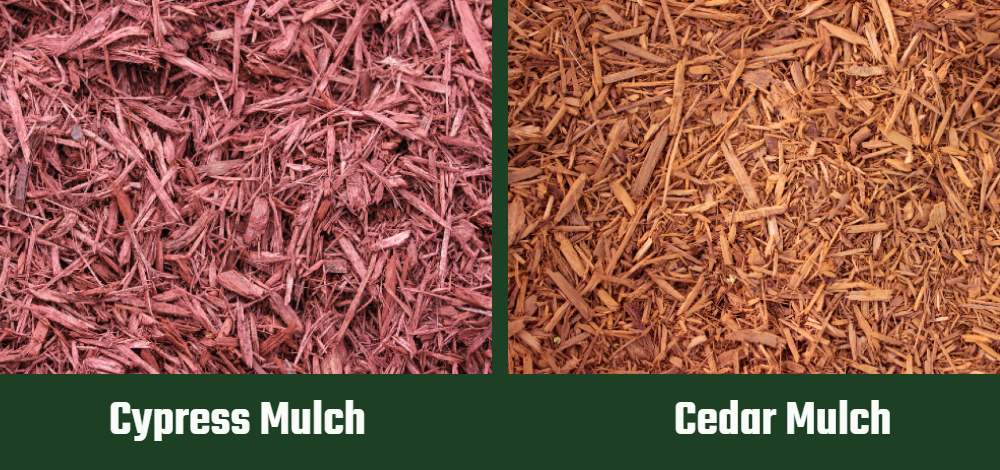Cypress Mulch vs. Cedar Mulch: What’s the Difference?
-
Codee Chessher
- Last updated:

Mulch is a vital part of any landscape because it protects plants’ vulnerable root systems from extreme temperatures. It also helps the roots retain more water. If you’ve been looking at mulch lately, you’ve probably come across cypress and cedar mulch. Although similar in some ways, these two mulches are very different. Let’s check out the exact differences between cypress mulch and cedar mulch and when you should use each one.

Overview of Cypress Mulch
Cypress mulch is a type of mulch composed of ground cypress trees. Bark, limbs, and virtually any part of the tree can be used to create the mulch. When made from mature trees, cypress mulch is naturally pest resistant, although it seems to attract termites. It also resists fungi and other forms of rot, which is great for your plants’ roots.
The biggest problem with cypress mulch is that it’s made from cypress trees, which aren’t naturally sustainable. Because of rampant deforestation, a lot of cypress mulch on the market comes from juvenile trees that lack the same pest resistance as mature trees.
Sustainability
The main issue with cypress mulch is that a cypress tree takes about 100 years to mature, and cypress trees are valuable parts of America’s wetland ecosystems. The demand for cypress wood is too high, and mulch contributes to this issue. If sustainability and being environmentally conscious are important to you, cypress mulch should be avoided.
When to Use Cypress Mulch
Cypress mulch is a great budget mulch because it lasts a long time in both chip and shredded form and retains its color well over time before decomposition. When applied in a 3–inch barrier around plants, it forms a great moisture barrier and protects plants from unsightly and dangerous weeds.
- More affordable than cedar mulch
- Heavy, which makes it a great choice for sloped gardens
- Repels most insect pests and fungi
- Tends to mat together into a barrier, which is useful in areas with soil erosion
- Attracts termites
- Less sustainable than cedar due to dwindling cypress tree populations
- Absorbs and repels water
- Immature trees may lack pest and rot resistance

Overview of Cedar Mulch
Cedar mulch is created with the heartwood or inner bark of the cedar tree. Cedar trees are found worldwide today but traditionally come from Asia and the Mediterranean. Cedar mulch is prized because it’s longer lasting than regular mulches or sawdust.
The mulch is widely available in chip or shredded form, which serves two different purposes. Chips are better for protecting small perennials and annual plants because they’re thicker and create a more secure base layer. Shreds offer more airflow, which makes them great for trees and hardier plants.
Water Absorption
As a hardwood, cedar absorbs water and retains it. For plants, this can be somewhat of a problem, as the mulch can prevent nourishing water from reaching the roots. To circumvent this problem, use a high-powered water hose to water plants that have cedar mulch.
When to Use Cedar Mulch
Cedar mulch is more expensive than cypress mulch but more sustainable. If you’re environmentally conscious, cedar mulch is the undisputed winner. It smells great and does the same job as cypress mulch.
- Naturally repels insects
- Lasts a long time before it decomposes
- Pleasant scent
- More sustainable
- More flammable
- May deter beneficial insects
- More expensive
- Can prevent plants from absorbing water
Which Mulch Is Best for Me?
In terms of affordability, cypress mulch is cheaper and does the same job as cedar mulch. However, it’s very unsustainable, and purchasing it helps support damage to wetland ecosystems. If you don’t mind that, cypress mulch is a great budget-friendly mulch for any garden.
If you don’t mind paying a bit more, cedar mulch is far more sustainable. It has a more distinct scent than cypress, although some people are allergic to the wood’s natural oils. It might lose its color and decompose a bit faster, but using cedar is the more responsible choice.
Conclusion
Both cedar and cypress mulch provide excellent protection for any plant, although cypress is produced from an unsustainable supply of trees. If you’re on a shoestring budget, however, cypress is slightly cheaper. Cedar does the same job at a slightly higher price point, but you don’t have to worry about contributing to deforestation.
Featured Image Credit: (L) Cypress Mulch, Janey Haun, Shutterstock | (R) Cedar Mulch, Julia Podus, Shutterstock
Contents
